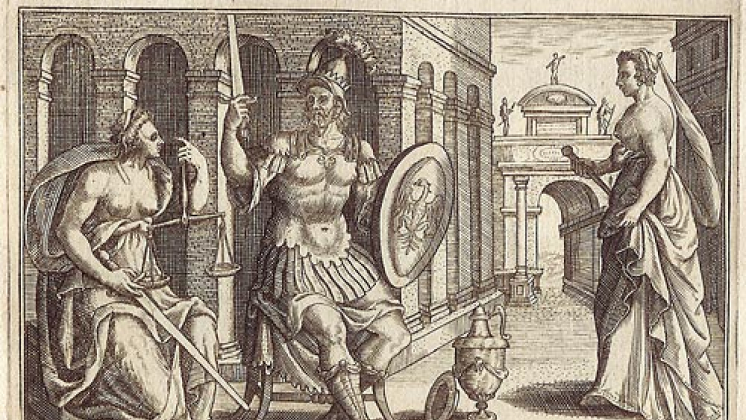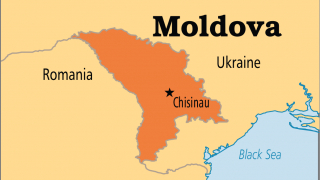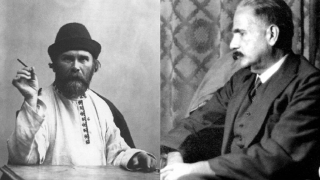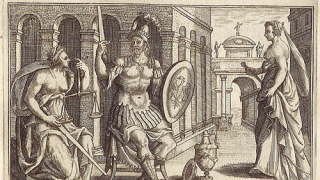On Law and Justice
Law in the crucible of history
Although in the present period legal norms are developed by politicians, laws originally predated politicians or were adopted only during the formation of political associations. In ancient times, many laws were attributed either to deities or cultural heroes, often those first kings who asserted order on the territory subject to them. The founding father of historical science, Herodotus, recalls that for Athens, the laws which were at the time called “prescriptions”, or Θεσμοί (This name is associated with the goddess Demeter who was called the “Law-Bringer” (Θεσμοφόρος), hence the celebration of Thesmophoria), were compiled by one of their wise citizens, Solon (7th-6th centuries BC), who immediately afterwards retired to traveling for ten years so that Athenians could not force him to change anything. As Carl Schmitt pointed out, Solon’s decrees were later transformed into the nomos, or νόμος, which can be translated not only as “law”, but “the spirit of the law.” It is no accident that in Ancient Greece this term was subject to various interpretations. Although Schmitt calls the nomos to be a foundational process combining order and localization, such was in fact the original seizure of land which represented a first form of demarcation and classification of space, its initial division and distribution.
Besides the nomos, Ancient Greece was also home to the resolution, or ψήφισμα, which is a specific decree by a popular assembly comparable to the decisions of modern-day parliaments. Referring to Aristotle, Schmitt points out the difference between the resolution and the nomos, the latter being that which defines a measure. In Ancient Greece one can also find the Themis, or Θέμις, which literally means “rule” or “rule over” (This word is also the origin of “themis” as an appellation for justice). Such was distinguished by divine origin and established a set of unwritten rights, maxims, and prohibitions handed down by the oracles which “perpetuated in the consciousness of the court a behavior which should be maintained whenever the matter at hand is order in the genus.” According to Benveniste, Θέμις supplemented δίκη, which is often translated as “justice”, “judgement”, or “sentence”, while δικασπόλος was the judge (originally the king) who monitors compliance with formulary regulations and has the right to pronounce the corresponding rule.
The Latin word dico, or “to say”, is directly related to the Greek δίκη, and the Latin ius, which is translated as “law”, is directly associated with the utterance of the oath (ius iurandum).
Morality, customs, and traditions are all in one way or another tied to legal codes and laws. But they can differ. The German teacher and anthropologist Eugen Fink warned against following the “commanding” or forbidding functions of morality since “in moral systems, often opposite ones, we find views that contain different evaluations albeit related to the same phenomenon.”
Even earlier than the Greeks, there is written evidence of laws in the Code of Hammurabi (18th century BC) written in the Akkadian cuneiform language. It is believed that, at this time, the system of law was so complete in terms of normative content and the use of legal constructs that such was superior to later Roman law from which European legal science originates, particularly the Justinian digests from the 6th century which laid the basis for modern civil law. However, many Western scholars are deliberately silent about the fact that Justinian was the Emperor of the Eastern Roman Empire, i.e., Byzantium, and they attach no importance to the development of legal aspects in Eastern Christianity, i.e. Orthodoxy, therein reducing the further development of the commentators (first the glossators and after them the post-glossators, who interpreted law in accordance with contemporary conditions) to the Bologna school of law, Germanic law, and the Code of Napoleon. It is only natural that, upon undergoing several stages of distortion, Roman law lost its original meaning, acquiring the scholastic deductions of copyists and commentators. Although they have been treated as supplements to the “national” laws in European countries, fragments of the digests based on the earlier Roman “law of peoples” (ius gentium) - in particular the declaration of war and concluding of peace, the division of peoples and the formation of new states, the status of ambassadors and the order of embassies, the protection of foreigners’ rights, and the status of prisoners - lie at the heart of international law, only distorted to meet the needs of Western countries.
Even if we take the earliest periods of the birth of law in Ancient Greece and Ancient Rome, we can already detect important differences. As is well known, portions of communities were compelled to migrate to other places due to overpopulation and a lack of sufficient land to meet needs. As Max Weber told “A Roman colony, therefore, whether we consider the nature of the establishment itself, or the motives for making it, was altogether different from a Greek one. The words accordingly, which in the original languages denote those different establishments, have very different meanings. The Latin word (Colonia) signifies simply a plantation. The Greek word (αποικα), on the contrary, signifies a separation of dwelling, a departure from home, a going out of the house.”
Over time, Rome developed a special institution which distributed land amongst the younger generation. The Curiate Assemblies in city-states decided, on the proposal of the father, which son should inherit the land and what part of the proles (offspring) should be landless, or “proletarians” (proletarii).
It is Jean-Jacques Rousseau’s idea of the social contract and John Hobbes’ vision of a system of control and balance in society as proposed in his work, Leviathan, that lie at the heart modern notion of a legal system and which are to this day considered to be important milestones in the history of global jurisprudence. But what about the legal schools of other regions, such as India, China, sub-Saharan Africa, and North and South America? After all, their teachings and conceptualizations of justice, accountability, duty, etc. each have their own distinct features.
Over the course of its evolution, the Western legal school often simply ignored the already developed legal codes of other regions, many of which were nevertheless at one point or another adopted in the West.
For example, three centuries before the first Western declaration of human rights, the League of the Iroquois in North America had declared all members of the Iroquois tribes to be free and equal in their rights and privileges.
Justice
As we have already seen, in many languages the very word “justice” is derived from the word for “law”, i.e., they have one and the same source. Even taking into consideration the fairly early secularization of the term introduced by Plato and then Aristotle in his Nicomachean Ethics, the term still directly refers to virtue and integrity. But let us pose an illustrative question: What virtue can there be when the right to access to natural resources such as water or land on the basis of a given agreement between indigenous peoples is annulled when they are altogether expelled from the lands on which their ancestors lived since time immemorial?
Attempts at addressing the question of justice have, nevertheless, been undertaken in the West. In this respect, rather indicative is John Rawls’ A Theory of Justice, which was an attempt at developing a credible alternative to the political-philosophical school of utilitarianism. The author saw a serious problem in the main institutions of constitutional democracy which prompted him to develop his own model. It is important to note that Rawls was essentially daring to revise the ideas of the “founding fathers” of Western rights and freedoms, i.e., the social contract theories of John Locke, Jean-Jacques Rousseau and Immanuel Kant. Rawls’ construct of society, however, was too ephemeral, as he proceeded from the premise that people have no intrinsic status and do not know their place in society. Thus, he rejected the thesis that man is directly shaped by society. The notion of redistributing wealth was also met with criticism on the part of liberal-minded scholars. Meanwhile, Rawls recognized that in addition to the most widespread notion of justice according to which members of society establish civil ties, other versions can exist as well insofar as the principles governing basic rights and obligations can themselves differ.
If we approach this issue from the standpoint of its relevance, then the problem is not so much in the philosophy of utilitarianism and the peculiarities of Anglo-Saxon thinking in which the right of precedent differs from continental legal school. The problem is that globalism is destructive by its nature, and these negative trends penetrate deep into different societies and cultures.
As the German writer and cultural critic Friedrich Georg Jünger noted: Today many have the extremely distinct feeling that things are slipping away from us. A process of alienation is ongoing which often with lighting speed leaves the thinker awestruck. The materiality of existing reality is disappearing. In our language, the word “thing” (Ding) originally meant speech, or conversation. Ding was also the meeting place for this conversation for which the meeting was held, as well as the place where people gathered to talk.Things appeared thanks to this place. And insofar as things appear thanks to this place, then if this place disappears, then so do things…Jurists speak of property rights, and these property rights are reflected in property law (Sachenrecht), which necessarily correlates with individual rights. When an entity and corresponding law disappear and objects disappear, then the law regulating this sphere disappears as well.
This was said in 1962. Needless to say, the situation has profoundly degenerated in the fifty years since.
Therefore, it is high time to rethink both international law and other Western legislative templates, and open a space for introducing amendments based on the cultural traditions of the many peoples of this planet. If it proves difficult to arrive at a common denominator as the basis of a new international law, then such must be made open, flexible, and inclusive without lifeless regulations and secularistic restrictions. After all, the denominators can be very different, proof of which we will provide in the examples below.
Translated from Russian by Jafe Arnold.














